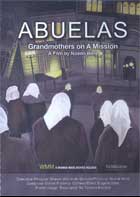
Abuelas: Grandmothers on a Mission 2012
Distributed by Women Make Movies, 115 W. 29th Street, Suite 1200,New York, NY, 10001; 212-925-0606
Produced by Noemi Weis
Directed by Noemi Weis
DVD , color, 28 min.
College - General Adult
Civil Rights, Human Rights, Argentina
Date Entered: 01/06/2014
Reviewed by Sandra Collins, Byzantine Catholic Seminary Library, Pittsburgh, PAFrom 1976-1982, Argentina was convulsed by “the dirty war,” a brutal dictatorship that was responsible for the disappearance of roughly 30,000 young men and women, some who openly agitated against the government, but many who did not. These desaparecidos, or disappeared ones, vanished without a trace. In 1977, the mothers of these desaparecidos began to march every Thursday in non-violent protest, requesting information and the return of their children. They came to be known as The Mothers of the Plaza de Mayo (Spanish: Asociación Madres de Plaza de Mayo). Over the years, this grassroots movement has grown far beyond passive resistance and consciousness-raising. Now, as they approach old age, these abuelas, or grandmothers, have taken dynamic steps to ensure the continuation of their work, especially since many of these desaparecidos were pregnant when abducted and gave birth while incarcerated. These grandmothers started a blood bank where they deposited their own blood in hopes that a grandchild might be able to ascertain his/her true biological family. Furthermore, they have recorded extensive family archives so that when they die, the memory of their families and especially their disappeared sons or daughters will remain for the lost grandchildren. Said one abuela, “We want to give these lost grandchildren their true identity.” So far, 105 grandchildren out of an estimated 400 have been identified and introduced to their biological families. Ultimately, this short film confirms the power of individuals to effect real social and political change as well as fostering the survival of a vision, even if the aging abuelas do not. Recommended for Latin American history as well as women’s history collections.